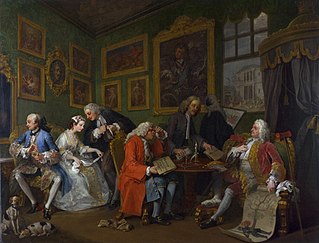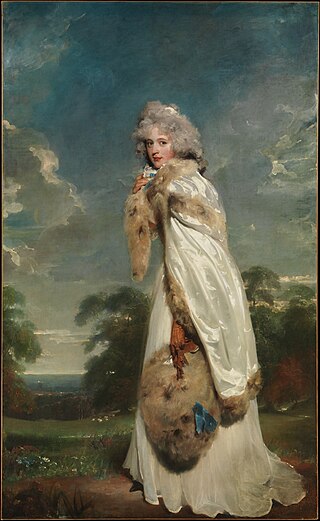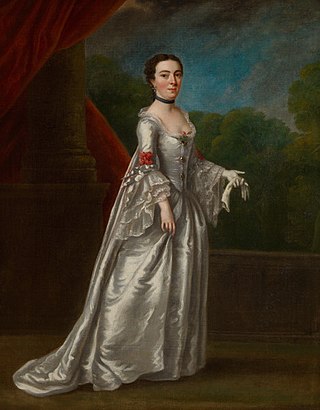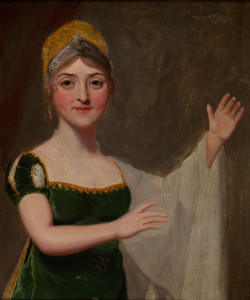
Robert Baddeley (1733–1794) was an English actor. His parentage is unknown, as is his place of birth, though the latter may have been London. He worked as a cook and valet, and one of his employers was the actor-manager Samuel Foote, who may have inspired him to take to the stage. He spent three years following another employer on a Grand Tour, which helped him to develop the facility with languages and accents which was to be a hallmark of his career.

Dorothea Jordan was an Anglo-Irish actress, as well as a courtesan. She was the long-time mistress of Prince William, Duke of Clarence, and the mother of 10 illegitimate children by him, all of whom took the surname FitzClarence. She was known professionally as Dorothea Francis and Dorothea Jordan, was informally Dora Jordan, and she commonly was referred to as Mrs Jordan and Mrs FitzClarence.

David Garrick was an English actor, playwright, theatre manager and producer who influenced nearly all aspects of European theatrical practice throughout the 18th century, and was a pupil and friend of Samuel Johnson. He appeared in several amateur theatricals, and with his appearance in the title role of Shakespeare's Richard III, audiences and managers began to take notice.

Susannah Maria Cibber was a celebrated English singer and actress. She was the sister of the composer Thomas Arne. Although she began her career as a soprano, her voice lowered in the early part of her career to that of a true contralto. She was universally admired for her ability to move her audiences emotionally both as an actress and vocalist. Possessing a sweet, expressive, and agile singing voice with a wide vocal range, Cibber was an immensely popular singer, even if at times her voice was criticized for a lack of polished technique. Charles Burney wrote of her singing that "by a natural pathos, and perfect conception of the words, she often penetrated the heart, when others, with infinitely greater voice and skill, could only reach the ear." Cibber was particularly admired by Handel, who wrote numerous parts especially for her including the contralto arias in his 1741 oratorio Messiah, the role of Micah in Samson, the role of Lichas in Hercules and the role of David in Saul among others. In the mid-1730s she began appearing in plays in addition to appearing in operas and oratorios. She became the greatest dramatic actress of the eighteenth-century London stage and at the time of her death was the highest-paid actress in England.

Margaret Woffington, known professionally as Peg Woffington, was an Irish actress and socialite of the Georgian era. Peg and Peggy were a common pet name for those called Margaret until the late 20th century.

The Clandestine Marriage is a comedy by George Colman the Elder and David Garrick, first performed in 1766 at Drury Lane. It is both a comedy of manners and a comedy of errors. The idea came from a series of pictures by William Hogarth entitled Marriage à-la-mode.

Elizabeth Farren was an Irish actress of the late 18th century. Born in Cork in 1759, her father, George Farren was a surgeon. His drinking habits brought on early death and his widow returned to Liverpool. Her mother went on the stage to support herself and her children. Elizabeth first appeared on the London stage in 1777 as Miss Hardcastle in She Stoops to Conquer and the following year appeared at Drury Lane which, along with the Haymarket Theatre became her primary venues for the rest of her acting career. She had over 100 characters in her repertoire including Shakespeare and various contemporary comedies and dramas. She was often compared to Frances Abington, who was her only real rival. Her last appearance was in April 1797, two months before her marriage to Edward Smith-Stanley, 12th Earl of Derby. They had a son and two daughters.

Charles Holland was an English actor, born in Chiswick, the son of a baker.

Charlotte Charke was an English actress, playwright, novelist, and autobiographer. She began acting at the age of seventeen in breeches roles, and took to wearing male clothing off stage as well, performing and being publicly known as "Charles Brown" from 1741. Her later career and her writings were conducted under her own name, "Mrs. Charlotte Charke", and identified her as the daughter of Colley Cibber. After being unsuccessful in a series of jobs associated with men at the time, such as valet, sausage maker, farmer, and tavern owner, she succeeded in her career as a writer and continued her work as a novelist and memoirist until her death in 1760.

George Anne Bellamy was an Irish actress. She took leading roles at Theatre Royal, Drury Lane.

Elizabeth Younge was an English actress who specialized in Shakespearean roles.

Elizabeth Rebecca Edwin was an Anglo-Irish stage actress active in Ireland and England during the late eighteenth and early nineteenth centuries.

Mary Wells, afterwards Mrs. Sumbel, was an English actress and memoirist.

Thomas King (1730–1805) was an English actor, known also as a theatre manager and dramatist.

Maria Rebecca Davison (1780?–1858) was a British stage actress. She was billed as Miss Duncan in the early years of her career before her marriage. She appeared as a leading performer at the London patent theatres Covent Garden, the Haymarket Theatre and particularly at Drury Lane.

Jane Powell or Mrs Powell was a British actress. She was also known as Mrs Renaud and Mrs Farmer.
David Ross was a British actor and theatre owner. After early appearances in Dublin, he appeared in London at Drury Lane and Covent Garden, and in Edinburgh, where as actor-manager he built a theatre.
Sarah Hamilton was an Irish stage actress and singer of the eighteenth century.
![<span class="mw-page-title-main">Margaret Cuyler</span> Cuyler [married name Rice], Margaret (1758–1814), actress and courtesan](https://upload.wikimedia.org/wikipedia/commons/thumb/7/7a/Troilus-and-cressida-mrs.margaret-cuyler-1758_-1814-as-cressida-2274.jpg/320px-Troilus-and-cressida-mrs.margaret-cuyler-1758_-1814-as-cressida-2274.jpg)
Margaret Cuyler became Margaret Rice was a British actress and courtesan.

Arabella Menage, also known as Mrs. Sharp, was a British actress and ballet dancer. She was the wife of the artist Michael William Sharp.


















![<span class="mw-page-title-main">Margaret Cuyler</span> Cuyler [married name Rice], Margaret (1758–1814), actress and courtesan](https://upload.wikimedia.org/wikipedia/commons/thumb/7/7a/Troilus-and-cressida-mrs.margaret-cuyler-1758_-1814-as-cressida-2274.jpg/320px-Troilus-and-cressida-mrs.margaret-cuyler-1758_-1814-as-cressida-2274.jpg)
